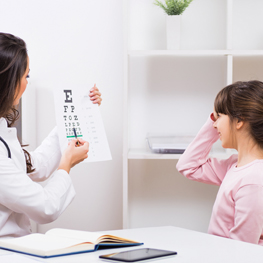
As you prepare your child’s back-to-school checklist, you want to make sure you have a comprehensive eye examination as part of that list. Did you know that 80 percent of learning is done through vision? Eye exams are just as important as dental visits and annual physicals. As an optometrist, I believe it is important to have your child’s eyes examined to encourage normal vision development and academic achievement.
Statistics show that 1 in 4 children have an undiagnosed vision problem that interferes with learning. A vision screening performed by a child’s paediatrician or primary care physician during a routine checkup or a screening done by a school nurse is not intended to replace a comprehensive eye examination done by an optometrist. A screening is limited and not sufficient to rule out significant visual problems. 40 percent of children who pass a vision screener fail their eye exam because vision is more than being able to see 20/20. Even worse, an eyesight problem can be misdiagnosed as a learning disorder such as dyslexia or Attention Deficit Disorder (ADD).
During eye examinations, I often see children who do not complain of vision problems despite experiencing symptoms. This is not uncommon as children do not know how they are supposed to see. If a child is experiencing blurred vision, they may think everyone sees the same way. If a parent sees well, they often assume their child does, too. To diagnose certain eye issues and prevent them from developing into lifelong vision problems, it is necessary to have your child’s eyes examined yearly.
At what age should a child have their first eye exam?
I recommend children should have their first eye exam at the age of six months during infancy and annually thereafter. The sooner we can see the infant, the sooner we can detect and diagnose any eye conditions that may be present. Treatment outcomes are better when the child is younger. Alberta Health and Wellness covers one comprehensive eye examination per year for children under the age of 18. No referral is needed to visit your optometrist, so I encourage parents to book your child in for their annual eye examination prior to the start of the school year.
A comprehensive eye examination with an optometrist takes into account:
1. The ocular and medical history of the child and their family.
2. The vision potential of each eye. Can your child clearly see the board, books, and computer?
3. The vision skills required for learning:
4. Color vision. If your child is color deficient, it is important to advise the school teacher.
5. Health of the eyes. If you are concerned your child is not able to read or recognize the alphabet during an eye exam, we have pictures, shapes, and symbols they can identify. For infants, we are primarily using our objective findings to ensure the eyes have developed well.
What symptoms should parents/teachers be monitoring for when a child is in school?
It is really important for parents and teachers to be aware and monitor for signs and symptoms a child may be experiencing that could be impacting their learning.
Some of the more common signs include:
Most parents are unaware of other signs and symptoms that are linked to vision and learning and those include:
If your child is experiencing any of these signs/symptoms, you should bring this up with your eye doctor during the eye exam. Treatments such as vision therapy or reading programs may need to be initiated to help with the underlying vision problem. Hence, it is critical for parents to have their children’s eyes checked before starting school to ensure their child has the best start to learning.
What is the Eye See…Eye Learn® program?
The Eye See… Eye Learn® program was developed to raise awareness amongst teachers and parents of the importance of having their child’s eyes examined during the Kindergarten year. A form is completed by our optometrist and the results are shared with their family doctor and school. If it is determined a child needs glasses during the Kindergarten year, the child gets a free pair through the program. For more information, visit optometrists.ab.ca/eye-see-eye-learn.
As an optometrist, I want to see children reach their full potential in school. A bright child can perform poorly in school and develop low self-esteem due to poor vision. A comprehensive eye examination will help ensure your child’s eyes are healthy, seeing well, and functioning optimally. Good vision is essential to the learning process. It’s important to have your child’s eyes examined by an optometrist annually to encourage success in school.
Dr. Farrah Sunderji, OD, completed her Optometry degree from the New England College of Optometry followed by a residency in Paediatrics and Vision Therapy. Her practice, Eyedeology, is located at #245, 520 - 3 Avenue SW. For more information on Dr. Farrah Sunderji, OD, and for more information on children’s vision, check out her website, eyedeology.ca.
Calgary’s Child Magazine © 2024 Calgary’s Child